Anemia-Stress Symptom Checker
How do your symptoms compare?
This tool helps you identify if your symptoms might indicate both anemia and chronic stress. Answer the questions below to receive personalized insights.
Check all symptoms you experience:
When you hear the word anemia is a condition where the blood lacks enough healthy red blood cells or hemoglobin to carry adequate oxygen, you probably think of fatigue or pale skin. But what if I told you that anemia can also crank up your body’s stress response? And the reverse is true - chronic stress can worsen the nutrient shortfalls that cause anemia. In this guide we’ll break down why iron, vitamin B12, and folate matter, how stress hormones like cortisol play a part, and what everyday steps can keep both problems in check.
Why the Body’s Stress System Matters
Stress isn’t just a feeling; it’s a cascade of hormones that start in the brain’s hypothalamic‑pituitary‑adrenal (HPA) axis. When you face a threat, the hypothalamus signals the pituitary gland, which releases ACTH, prompting the adrenal glands to pour out cortisol. Short‑term spikes help you react, but long‑term elevation is a different story: cortisol can suppress appetite, alter gut motility, and even interfere with iron absorption.
How Nutritional Deficiencies Trigger Anemia
Three nutrients are the usual suspects behind anemia of nutritional origin:
- Iron - the core component of hemoglobin, the protein that binds oxygen in red blood cells.
- Vitamin B12 - essential for DNA synthesis in developing red blood cells.
- Folate (vitamin B9) - works hand‑in‑hand with B12 to form new cells.
If any of these dip below optimal levels, the bone marrow can’t keep up, leading to fewer or malformed red blood cells. The result? Less oxygen to tissues, a faster heart rate, and that classic fatigue you associate with anemia.
Stress Makes Nutrient Deficiencies Worse
Stress compounds the problem in three main ways:
- Appetite suppression - cortisol spikes can blunt hunger signals, leading to skipped meals or a preference for “quick” carbs over iron‑rich foods.
- Gut health disruption - chronic stress alters the microbiome, reducing the gut’s ability to absorb iron, B12, and folate.
- Inflammatory pathways - the body releases cytokines that lock iron inside storage cells, a condition known as anemia of inflammation.
In practical terms, someone under constant pressure may end up drinking coffee all day, neglecting leafy greens, and missing out on meat or fortified cereals - a perfect recipe for anemia.
Spotting the Overlap: Symptoms to Watch
Both anemia and chronic stress share a handful of warning signs. Use this quick checklist to decide whether you might be dealing with one, the other, or both:
- Persistent fatigue that doesn’t improve after a night’s sleep.
- Shortness of breath during mild activity (climbing stairs, walking to the bus).
- Heart palpitations or a racing heartbeat.
- Difficulty concentrating - “brain fog” is a classic stress symptom but can also stem from low oxygen.
- Changes in mood: irritability, anxiety, or a sense of hopelessness.
- Pale or yellowish skin, especially around the nail beds.
- Craving non‑food items (pica) - often linked to iron deficiency.
If you tick more than half of these, a blood test (CBC with iron studies, B12, and folate levels) is a smart next step.
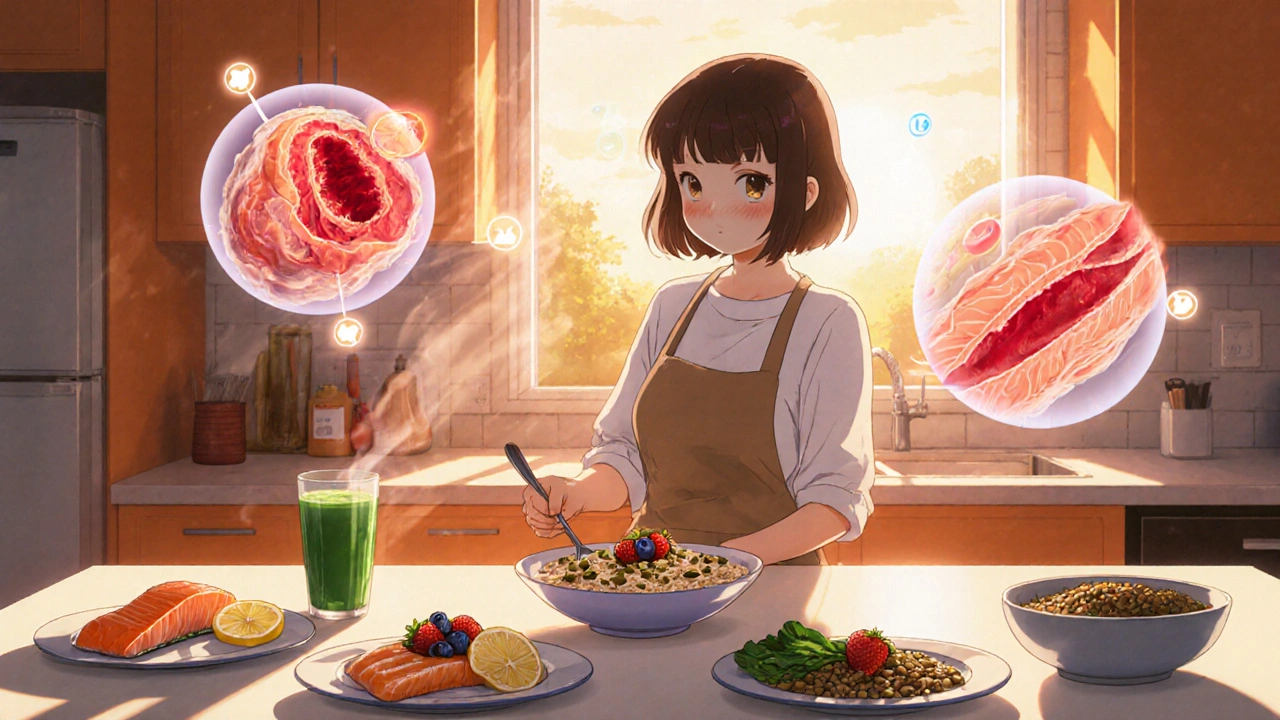
Nutrition Hacks to Beat Both Anemia and Stress
Here’s a practical, food‑first plan that targets the three key nutrients while also calming the stress response:
- Iron‑rich breakfast: Start the day with fortified oatmeal topped with pumpkin seeds and a drizzle of lemon juice (vitamin C boosts iron absorption).
- Vitamin B12 boost: Include a serving of smoked salmon, sardines, or fortified plant milks. For vegans, a B12 supplement of 25‑50 µg daily is recommended.
- Folate power: Add a handful of spinach or kale to smoothies, and pair with beans, lentils, or avocado.
- Stress‑busting snacks: Keep walnuts, dark chocolate (70%+), and fresh berries on hand - they contain magnesium and antioxidants that modulate cortisol.
- Hydration & timing: Drink water throughout the day and avoid heavy caffeine after lunch; caffeine can increase cortisol and hinder iron uptake.
- Mindful meals: Sit down, chew slowly, and focus on the flavors. Mindful eating has been shown to lower post‑meal cortisol spikes.
Following this plan for at least 4‑6 weeks often restores iron and B12 stores, while many people report feeling calmer and more energetic.
Comparison Table: Nutrient Deficiencies vs. Stress‑Related Effects
| Aspect | Iron Deficiency | Vitamin B12 Deficiency | Folate Deficiency | Chronic Stress Impact |
|---|---|---|---|---|
| Primary Blood Marker | Low serum ferritin and hemoglobin | Elevated methylmalonic acid, low B12 | Low RBC folate, macrocytosis | Elevated cortisol, possible anemia of inflammation |
| Typical Symptoms | Fatigue, pica, restless legs | Numbness, memory issues, mood swings | Growth issues (in children), depression | Insomnia, anxiety, reduced appetite |
| Dietary Sources | Red meat, lentils, fortified cereals | Shellfish, meat, fortified soy milk | Leafy greens, beans, citrus | Omega‑3 rich fish, nuts, whole grains (stress‑modulating) |
| Key Intervention | Iron supplementation (FeSO4 100 mg) + vitamin C | Monthly B12 injection or oral 1 mg | Folate 400‑800 µg daily | Stress management + balanced diet |
Practical Steps to Manage Stress While Healing Anemia
Even with the right nutrients, you’ll struggle if stress keeps pulling you off track. Here are three low‑cost habits that pair well with the diet plan above:
- Breathing breaks: 4‑7‑8 breathing (inhale 4 sec, hold 7 sec, exhale 8 sec) twice a day drops cortisol by up to 20%.
- Walk‑and‑talk: A 15‑minute brisk walk after lunch improves circulation, helps iron delivery to tissues, and resets the nervous system.
- Digital sunset: Turn off screens an hour before bed. Blue light disrupts melatonin, which can amplify stress hormones.
Combine these with weekly check‑ins - either a short journal entry or a quick blood pressure reading - to see tangible progress.

When to Seek Professional Help
Self‑management works for many, but some signals demand a clinician’s eye:
- Hemoglobin below 10 g/dL (moderate to severe anemia).
- Persistent numbness, tingling, or gait problems - possible B12 nerve damage.
- Unexplained weight loss, night sweats, or fever - could hint at underlying disease.
- Stress that feels unmanageable despite lifestyle tweaks - a therapist or counselor can provide coping tools.
A doctor can order a comprehensive panel (CBC, ferritin, serum iron, TIBC, B12, folate, CRP) and tailor supplementation. In some cases, intravenous iron or B12 injections are faster than oral pills.
Quick Recap
- Anemia isn’t just low iron - B12 and folate matter too.
- Chronic stress sabotages nutrient absorption and can trigger anemia of inflammation.
- Eat iron‑rich meals with vitamin C, add B12 and folate sources, and choose stress‑busting snacks.
- Simple habits - breathing, walks, screen curfew - lower cortisol and help your blood carry oxygen efficiently.
- Get a blood test if symptoms linger; professional care can speed recovery.
Frequently Asked Questions
Can iron supplements worsen stress?
High doses of iron can irritate the stomach and disrupt sleep, which may raise cortisol. That’s why it’s best to take iron with food, pair it with vitamin C, and stay within the recommended 45 mg daily unless a doctor advises otherwise.
Is anemia a cause of anxiety?
Low oxygen delivery can make the heart race and brain fog worse, which many people mistake for anxiety. Treating the anemia often reduces those physical triggers, but underlying anxiety may still need therapy or medication.
How long does it take to recover from iron‑deficiency anemia?
With proper iron intake, hemoglobin usually rises in 2‑3 weeks, but full stores (ferritin) can take 2‑3 months. Continue the diet plan for at least six weeks after symptoms improve to avoid relapse.
Do vegans need to worry about anemia?
Vegans can get iron from legumes, tofu, nuts, and fortified grains, but plant iron (non‑heme) isn’t absorbed as well. Pairing these foods with vitamin C and considering a B12 supplement is essential to keep anemia at bay.
Can stress cause a drop in vitamin B12 levels?
Stress can impair stomach acid production, which is needed to release B12 from food. Over time, that can lower B12 absorption, especially in older adults.

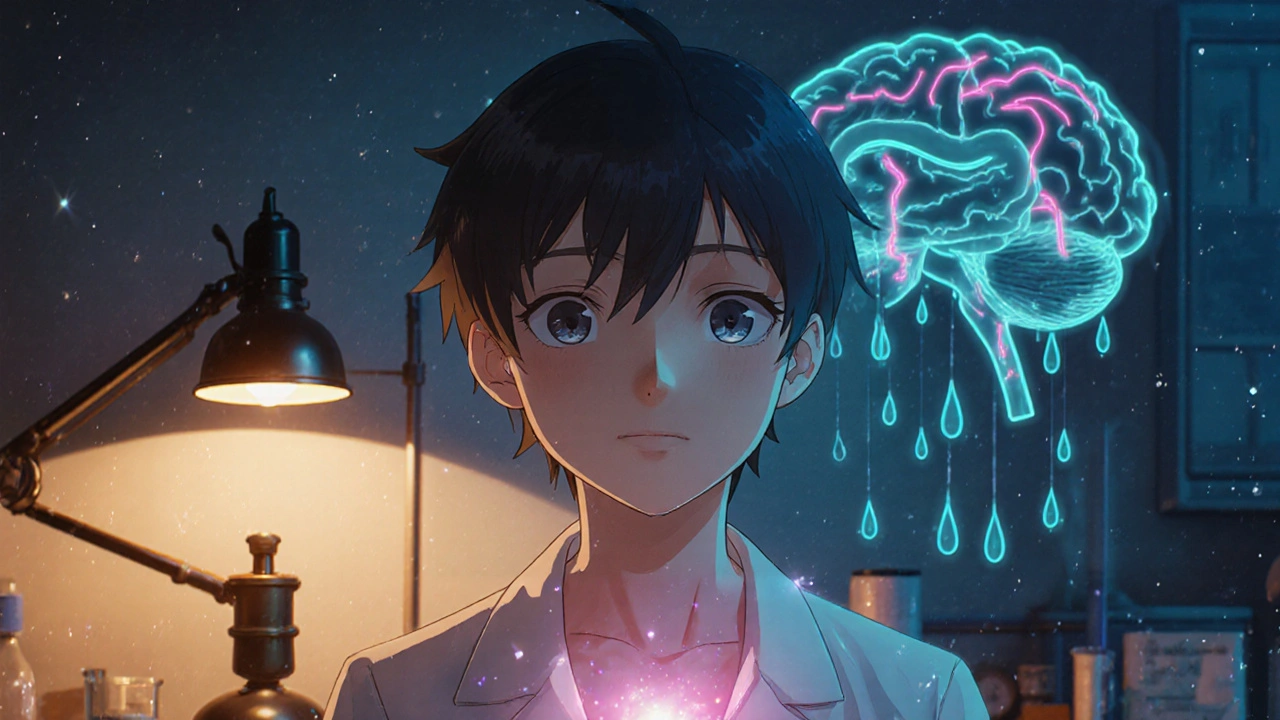

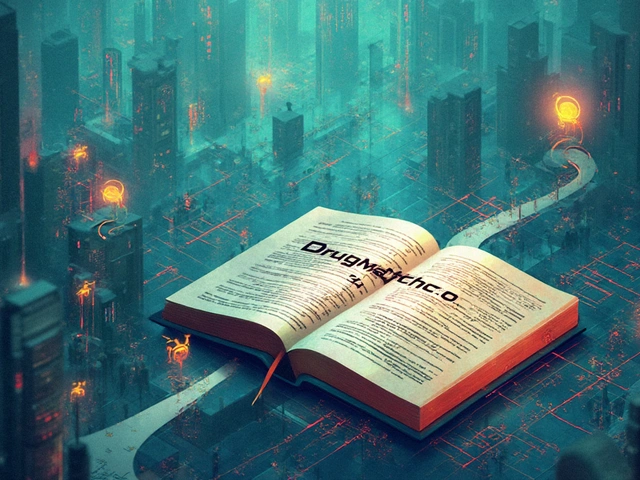
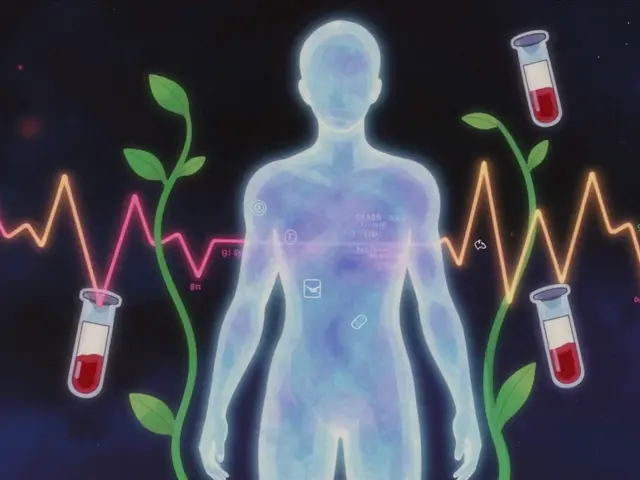
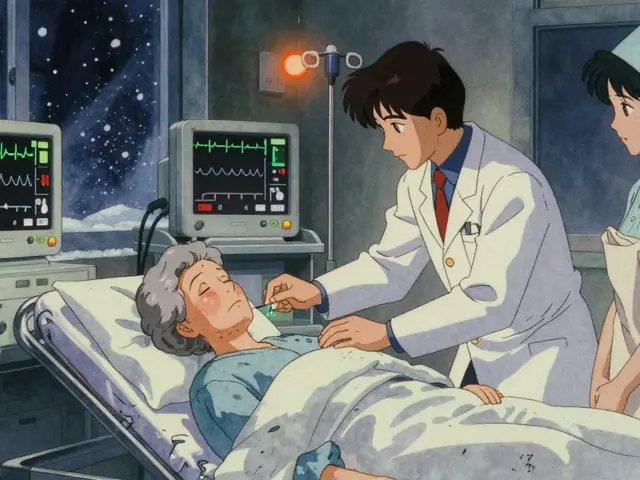
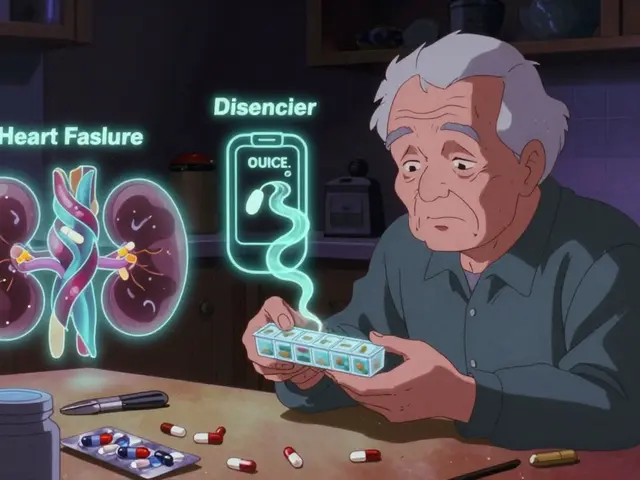

Yo, they dont tell u that the pharma lizards push iron pills to keep us jittery.
That’s a wild take but real talk folks iron deficiency can mess with mood and energy levels so checking labs is key
When the blood runs thin, the soul feels the weight of invisible chains; low hemoglobin whispers doubts, while cortisol shouts louder, creating a storm inside the marrow.
It’s useful to remember that stress and anemia share many symptoms, so a balanced approach that includes both dietary changes and stress‑management techniques often works best.
First, iron absorption is highly dependent on gastric acidity, which is often suppressed during prolonged stress, meaning the stomach produces less hydrochloric acid to free iron from food. Second, cortisol can up‑regulate hepcidin, a peptide hormone that traps iron inside macrophages and reduces its release into the bloodstream. Third, the microbiome shifts caused by chronic stress diminish the population of lactobacilli that aid in synthesizing B‑group vitamins, including B12 and folate. Fourth, many stress‑induced eating patterns favour refined carbohydrates over leafy greens, legumes, and lean meats, directly decreasing the intake of the very nutrients needed for erythropoiesis. Fifth, vitamin C is an essential enhancer of non‑heme iron absorption, yet stressed individuals often skip citrus fruits in favor of coffee, which actually inhibits iron uptake. Sixth, B12 requires intrinsic factor secreted by gastric parietal cells; when stress reduces gastric secretions, even a diet rich in B12 can become insufficient. Seventh, folate metabolism depends on the enzyme methylenetetrahydrofolate reductase, which can be down‑regulated by inflammatory cytokines released during stress. Eighth, the HPA‑axis feedback loop means that elevated cortisol can blunt the appetite centre in the hypothalamus, leading to overall reduced caloric and micronutrient intake. Ninth, chronic stress promotes chronic low‑grade inflammation, raising C‑reactive protein levels that sequester iron in the reticuloendothelial system, a phenomenon known as anemia of inflammation. Tenth, the combined effect of reduced absorption, increased sequestration, and poor dietary choices creates a perfect storm for iron‑deficiency anemia. Eleventh, a practical countermeasure is to pair iron‑rich meals with vitamin C sources like lemon juice or bell peppers, and to avoid tea or coffee for at least an hour afterwards. Twelfth, supplementing with a low‑dose B12 sublingual tablet can bypass gastric absorption issues when stress is high. Thirteenth, incorporating fermented foods such as kefir or sauerkraut can help restore a healthier gut flora, indirectly supporting nutrient uptake. Fourteenth, scheduled mindfulness or breathing exercises have been shown to lower cortisol by up to 20 %, which can improve both appetite and iron metabolism. Fifteenth, regular monitoring of ferritin, B12, and folate levels every three months while implementing these lifestyle adjustments provides objective feedback and helps prevent relapse.
Great points happy to add that iron‑rich snacks like trail mix with dried apricots work well during busy days
While the article covers the basics adequately, it neglects to mention that certain genetic polymorphisms, such as MTHFR C677T, can impair folate metabolism and exacerbate stress‑related anemia; screening for these variants is advisable when standard supplementation fails.
Honestly, the guide feels like a checklist rather than a deep dive; a more nuanced exploration of the neuroendocrine feedback loops would have been appreciated.
Everyone loves a tidy list, but real life is messy – you can’t just eat spinach and expect cortisol to drop; stress hormones are driven by mind‑set, social pressures, and even weather, not just nutrients.
It’s morally troubling that our society pushes fast‑food culture while ignoring the silent epidemic of nutrient‑poor diets that fuels both anxiety and anemia; we must demand better food policies and education.
Bottom line take a balanced diet good iron sources vitamin C and B12 and add a few breathing breaks each day you’ll feel the difference.